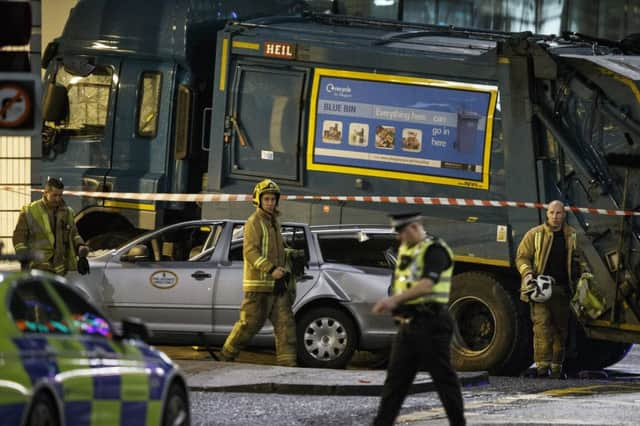Bin lorries to avoid Glasgow crash site on anniversary


Six people died as the lorry careered along Queen Street in the city centre when driver Harry Clarke lost consciousness at the wheel on December 22 last year.
With some people expected to return to the scene to pay tribute to those who were killed, Glasgow City Council has decided to remove collection lorries, like the one involved in the crash, from the route.
Advertisement
Hide AdAdvertisement
Hide AdIt comes as safety charity Living Streets Scotland said safety measures continue to be overlooked on the dangers of large vehicles in city centres.
The charity has called for lower speed limits and restrictions on the number of heavy vehicles entering town centres at busy shopping times.
A Glasgow City Council spokesman said: “It is possible that some people may wish to visit the scene of the accident on the afternoon of 22 December; both to reflect and to remember those who lost their lives - and we will take that into account in terms of how refuse services operate.
“Collections will still take place across the city, but we do not intend to have vehicles like the one involved in the accident operating in or around Queen Street at that time.”
The Sheriff who chaired the fatal accident inquiry (FAI) into the bin lorry crash made a number of recommendations in his determination, including a call for councils to take into account “the potential for the presence of exceptional numbers of pedestrians at particular times” when drawing up risk assessments.
Living Streets director Stuart Hay told BBC Radio Scotland: “I think it’s a bad combination when you have large vehicles and lots of pedestrians and we really need to minimise that as far as practicable. That was one of the lessons from the Glasgow inquiry.
“There’s two recommendations concerning bin lorry routes, they need to be looked at along with the main recommendations.
Advertisement
Hide AdAdvertisement
Hide Ad“What we do know is if you have a large vehicle when there’s lots of pedestrians the risks increase. It may be possible through good planning to reduce the number of vehicles in city centres; also reducing speeds - 20mph limits in city centres will make a big difference in this respect.”
Erin McQuade, 18, and her grandparents Jack Sweeney, 68, and Lorraine Sweeney, 69, from Dumbarton; Stephenie Tait, 29, and Jacqueline Morton, 51, both from Glasgow; and Gillian Ewing, 52, from Edinburgh, lost their lives in the crash.
A special service, organised by Glasgow Churches Together, will also be held to mark the anniversary of the bin lorry crash at Glasgow Cathedral on December 22.
First Minister Nicola Sturgeon, Glasgow’s Lord Provost Sadie Docherty and local politicians will all attend along with representatives of the emergency services and people who helped at the scene.
The families of those affected by the incident have also been invited to attend.
In his FAI report, Sheriff John Beckett QC ruled that the crash might have been avoided if Mr Clarke had told the truth about his medical history after it emerged he had previously blacked out while at the wheel of a stationary bus.
Sheriff Beckett found the 58-year-old had “repeatedly lied in order to gain and retain jobs and licences”, and “deliberately concealed relevant information from the DVLA”.
Advertisement
Hide AdAdvertisement
Hide AdHe found eight “reasonable precautions” - all relating to Mr Clarke’s medical past - whereby the accident might have been avoided and made a series of recommendations which could reduce the chance of another such tragedy from happening.